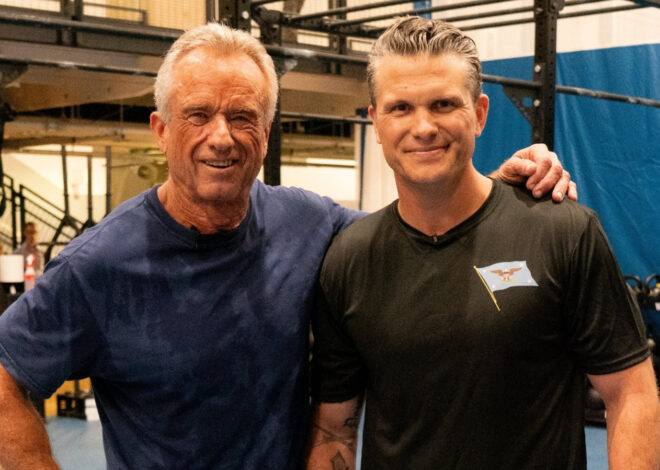
When You Follow The 7-Day Juice Cleanse, Here’s What Happens To Your Body – Health Digest
You might be familiar with the idea of a juice cleanse. If you’re accustomed to eating a normal diet, switching to an all-fruit-and-vegetable beverage plan can be quite a departure. This is a popular choice, though, for those who hope to kickstart healthier overall habits, who want to detox their bodies, or shed a few pounds. Increasing fruit and vegetable intake, after all, is something that’s hammered into all of us from a very young age.
It makes sense, as these naturally vitamin- and nutrient-packed foods could boost energy, improve digestion, and deliver what you need without much effort. While the idea of going on a multi-day juice cleanse may sound relatively appealing (and even appetizing!) from the outset, the truth is that there’s a lot more going on inside the body than meets the eye. Juice cleanses may flood your system with vital nutrients, but there’s more to it than simply sipping a vibrant beverage and feeling immediately refreshed.
In truth, juicing can trigger a variety of changes, some of which might catch you off guard. It’s important to understand what to expect so you can weigh the benefits and drawbacks before committing to a full week without solid food. Yes, it may be temporary, but the effects could linger. Here’s everything that you need to know about seven-day juice cleanses so you can make an informed decision about what your body needs.
You’ll be thinking about food (a lot) on the first day of a juice cleanse
Day one holds a lot of promise. You’re ready to delve into a healthy world where issues like mindless snacking and overindulging become things of the past. What you may not anticipate is the constant barrage of thoughts about — you guessed it — food. The sudden shift from consuming actual meals to nothing but juice is dramatic. Instead of your usual morning oatmeal or eggs, you’re suddenly sipping on a green drink.
Many find they crave not just the taste of their favorite foods, but also the textures that they are accustomed to experiencing throughout the day. That can make tolerating cravings especially difficult. Confirms integrative gastroenterologist Robynne Chutkan, M.D., to Shape, “Right off the bat, you may notice you’re thinking about what you could be eating, should be eating, and want to be eating, so cravings can occur right away.”
Be prepared for a few of the usual signals that your mind is wondering where the food suddenly went. Your stomach might growl, for example, and you may even feel a bit “hangry” and irritable as your body starts adjusting to the lack of usual fuel. You might find yourself daydreaming about what you’d be eating right about now. These moments will undeniably test your resolve, but if you’re committed to the cleanse, you might remind yourself that it’s temporary. Plus, says Dr. Chutkan, the cravings tend to diminish after a day or so.
Your metabolism slows down on a juice cleanse
Your body responds to a juice cleanse and the lack of vital protein, fats, and carbohydrates by conserving energy and slowing metabolism. This is your body’s way of adapting to the reduced calorie intake and ensuring that it can make the most of the limited energy it has. Your metabolism switches gears to maintain balance throughout the cleanse. Nutritionist Ilyse Schapiro tells Time, “Your body goes into conservation mode because it doesn’t know when its next meal is going to be.”
As your metabolism slows, you might notice you feel a bit different. Energy levels could plummet, especially during the first few days. You may even find that you’re colder than usual because the slowed metabolism could cause your body to generate less heat than normal. Physical activity might feel more taxing simply because you lack stamina to work out. All of these changes are your body’s way of holding on to energy.
While the juice cleanse can generally help you feel lighter initially, the slowed metabolism could actually impact the way your body processes food when you resume “normal” eating. It might take a while for your metabolism to speed up again, especially if you simply go back to your usual normal portions. That, according to Scripps Clinic family medicine physician Tara Robbins, M.D., can be detrimental to your wider efforts. “A juice cleanse can slow your metabolism, which may contribute to weight gain when you return to a regular diet.”
You’ll learn whether you disagree with certain foods on a juice cleanse
If you suspect that your body doesn’t agree with certain foods but aren’t sure which ones, you could learn a lot from the cleanse. Because you aren’t consuming allergens like wheat, dairy, gluten, and processed ingredients, you might experience relief from certain symptoms that you weren’t 100% certain were related to your diet. This temporary reset can bring some clarity, especially if you struggle with uncomfortable bloating, digestive distress, and even skin issues. In fact, says registered dietitian Sharon Jaeger, RD, to the Cleveland Clinic, “Elimination diets are the gold standard for figuring out which foods don’t agree with you.”
When you finish the cleanse and reintroduce solid foods, be mindful of how your body reacts. It’s best to start eating foods slowly so you can better identify potential culprits. If you feel bloated after eating bread or experience discomfort when you consume dairy, it may indicate your body has trouble properly processing those foods. A cleanse basically wipes your body’s “slate” clean, helping you pinpoint the ingredients that disagree with your system.
It can be especially helpful for those whose suspected food sensitivities were difficult to identify. Juice cleanses don’t replace allergy tests, of course, but they can provide valuable insight into areas that might need some more exploration. Using that information, you can make more informed decisions about your diet, experiment with eliminating certain foods, and replace them with alternatives that will hopefully agree with you.
You’ll experience a sugar spike on a juice cleanse
While fruits are undeniably loaded with essential vitamins, nutrients, and antioxidants, they also contain a significant amount of natural sugar. Because you aren’t consuming what is considered a “whole” diet, your body naturally experiences a spike in blood glucose, due both to being low in fiber (a natural effect of juicing) and high in carbohydrates. One of the most effective ways to prevent the spike is to eat something fibrous or with protein.
When you’re juicing exclusively, though, that’s not an option — and the sudden sugar influx can have a dramatic impact on how you feel. You might have plenty of energy initially, but it’s common to experience the notorious sugar “crash” shortly thereafter. As your energy diminishes, you may find that you feel sluggish, lightheaded, and even grumpy. This is why, despite the best efforts to “detox” through drinking juice, some people don’t experience that particular effect.
Dr. Tara Robbins, M.D. of Scripps Clinic Del Mar says, “Juice cleanses load your body up with sugar, which is anything but detoxifying. Plus, all that sugar causes your blood pressure to spike and then rapidly drop, which can give you a burst of energy but then leave you feeling even more tired, as well as interfere with how your body uses insulin.” For these reasons, it’s generally best to consult a doctor before starting a juice cleanse if you have diabetes or hypertension.
Your body lacks fiber during a juice cleanse
There’s no question that your fruit and vegetable intake increases during a juice cleanse — but it may come as a surprise to learn that you don’t get all of the benefits they normally provide. That’s because the juicing process removes the pulp, which is the component of the fruit that’s rich in vital fiber. What’s left is merely the liquid. Dr. Anthony Auriemma, M.D., tells Reader’s Digest that this can have a variety of effects on your body. “Fiber is an important part of digestion — it slows the rise in blood sugar, helps feed gut bacteria, and improves bowel function.”
Fiber generally behaves like a buffer, protecting your body from rapidly absorbing the natural sugars in the fruits and preventing the spikes that can otherwise leave you depleted. Without this built-in safeguard, you may be particularly vulnerable to fluctuating blood sugar levels that leave you feeling less than optimal.
Plus, fiber is absolutely vital to keeping you full. If you find that you’re consistently hungry and craving solid food during your juice cleanse, that’s likely because you’ve completely omitted fiber from your diet. The irony is that, if you’re hoping to lose weight, it’s fiber that could be most beneficial. “[f]iber is great for weight management,” according to gastroenterologist and physician nutrition specialist Dr. Carolyn Newberry, M.D., of NewYork-Presbyterian/Weill Cornell Medical Center. She adds, “[i]t can also help with appetite regulation and avoiding overeating.”
You may begin to lose muscle on a juice cleanse
While it’s true that you might lose some weight while juicing, it’s not necessarily the type you want. Without protein, your body begins to break down muscle tissue to meet its energy demands. Protein is vital for maintaining muscle mass and supporting metabolism. When your diet lacks it, though, it has no option but to tap into your existing stores for what it needs.
As your muscle mass depletes, you may experience decreased strength and a lack of overall energy. There are significant implications linked to this newfound issue, as it can have a marked impact on your body’s ability to burn calories even when you’re at rest (the mark of healthy metabolism). As muscle loss increases, metabolism slows — and that can make it considerably more challenging to lose weight over time. Says Dana Hunnes, a senior dietitian at the Ronald Reagan UCLA Medical Center, muscle is “the powerhouse calorie-burner of the body.”
You’re not only too exhausted to work out, but you enter a cycle in which the weight you lost during the cleanse rapidly returns as soon as you resume eating solid food. The aforementioned exhaustion can have more long-term implications, too. Regular workouts are vital to everything from heart to brain health, supporting your vital organs, your mood, and your weight. If you began a juice cleanse in the hopes of becoming healthier, it could backfire simply because of its impact on your muscle mass.
You can actually lose some important nutrients in a juice cleanse
Despite the fact that fruits and vegetables contain a cocktail of nutrients, you may not actually get everything that you need during a juice cleanse. While you will enjoy more concentrated doses of certain nutrients, like vitamin C and potassium, you won’t benefit from others that your body requires to function optimally. Protein, essential for muscle repair and energy, is absent from juice cleanses, and there’s no sign of brain- and heart-friendly healthy fats in a strictly juice-based diet.
One vitamin that’s especially lacking, according to wellness dietitian Amanda Beaver of Houston Methodist, is B12. A loss of B12 over time could be significant, as it supports your body’s red blood cell production and nervous system. Because it’s found almost exclusively in animal-based products like meat, fish, eggs, and dairy, it’s essentially impossible to get what you need during a week-long juice cleanse. That can lead to symptoms like fatigue and mood changes.
Beaver says that if you’re interested in some variation of juicing because you’re curious about how it may affect your health and wellbeing, there’s a better option. “One delicious way to get the potential benefits of juicing, plus the natural fiber from these foods, is to enjoy fruits and veggies in smoothie form.” If you have any doubt about whether a cleanse is the right option for you based on your unique blood profile, it’s best to consult with your doctor first.
You may discover a love of fruits and vegetables during a juice cleanse
Maybe you’ve never been the type to reach for an apple or carrot sticks when you feel hungry. A cleanse could be eye-opening because it forces you to explore a range of fruits and vegetables that might not be a part of your diet. The options are virtually endless, as you can meld sweet and tangy citrus fruits with earthy vegetables and herbs to create flavor profiles that may be completely new to you. If you like them enough, you might even be inspired to integrate them into your everyday meals once your cleanse wraps up.
It may also give you some clarity into how you might prefer to consume certain fruits and vegetables. Maybe in their raw form, carrots aren’t quite your thing. Added to a juice or a smoothie, though, you could potentially enjoy them far more frequently. This is a positive effect that could shift your general mindset about fruits and vegetables, especially if you generally view eating them as more of a chore and less of a tasty addition to your diet. That’s a huge plus if your goal in juicing for seven days is to become healthier.
If you’re curious about juicing, you might consider starting small, such as experimenting with a much shorter two- or three-day cleanse instead. You might even simply replace your usual morning meal with a juice concoction to see if you enjoy it enough to keep going.


